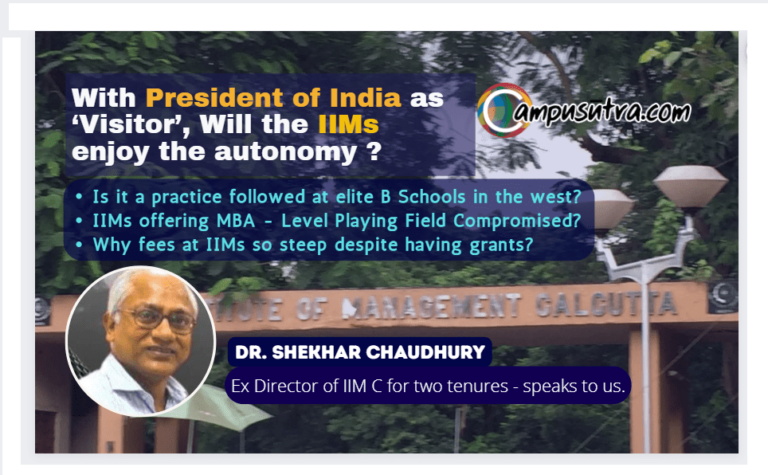The Centre appears to have taken control of the Indian Institutes of Management (IIMs) as it notified new norms for the appointment of the board of governors (BoG) and directors. Under the IIM (Amendment) Bill, introduced in the Lok Sabha by education minister Dharmendra Pradhan, the President will be the Visitor to the IIMs, like in the IITs and with similar powers. The Centre introduced this bill in Parliament in July 2023, seeking to take over the power of appointing the chairpersons and directors of the Indian Institutes of Management (IIMs), The amendment introduced to the IIM Act, takes back many of the powers from the Board, giving the government a greater say in auditing the functioning of IIMs, ordering probes, and appointing as well as removing directors.
Under the new scheme of things, the search-cum selection committee will present before the ‘Visitor’ – the President of India list of three names of candidates being consi dered for the post of director. If the Visitor is not satisfied with the names proposed by the search committee, he/she may seek fresh recommendations from the same committee or constitute a fresh search-cum-selection committee for the purpose.
dered for the post of director. If the Visitor is not satisfied with the names proposed by the search committee, he/she may seek fresh recommendations from the same committee or constitute a fresh search-cum-selection committee for the purpose.
With this new move the President of India as ‘Visitor’ will have powers to appoint & remove directors, the pertinent question is – Will the IIMs enjoy the autonomy? Will there be interference in their day-to-day affairs?
Team Campusutra talks to Prof. Dr. Shekhar Chaudhuri, erstwhile Director of IIM Calcutta – who was one of the few to have served two full tenures as Director of IIM Calcutta and has been associated with multiple Business Schools and institutions in India and abroad.
He responds to our questions and explains how this might work.
Q. Will it affect IIMs? Is their autonomy under threat ?
When I was the Director at IIM Calcutta, the Chairperson and Director were appointed by the Govt of India. Director’s appointment was approved by the Appointments Committee of the Cabinet. And the Chairman of each institute was appointed by the Govt of India, Ministry of Education.
After the passing of the IIM Act by the Parliament in 2017 till the current amendment of the ACT, approximately 6 years – the Boards of the IIMs were empowered to set up Search cum Selection Committees for the director’s appointment in the respective institutes.
This will, however change. We will go back to the previous situation to some extent, wherein the Ministry used to coordinate and initiate the recruitment process of the Director. The Search cum Selection Committee was set up by the Ministry and Chairman of this Committee, a senior person either from industry or academia was also appointed by Govt of India. The Chairman of the Board was also a member of the committee as a representative of the Board, along with experts from industry and academia.
The new norms, which makes the President of India the Visitor of each IIM, giving the government the final say in the appointment of the chairperson of the board and the director, is in a way going back to similar to what it used to be prior to 2017. As per the IIM Rules of 2018, the board of governors of each institute held exclusive authority to remove the director if it was decided by at least two-thirds of its members.
This can be a good practice which used to be followed earlier. The Autonomy of the Board, however, as far as “Appointment of Director” is concerned will be reduced with the President of India becoming the Visitor and taking the final call. However, to my mind this need not affect the day -to- day functioning of the institutes.
Q. Will there be any curb in autonomy to introduce new courses or the freedom to make pedagogical changes or in terms of delivery of the learning?
I don’t think operational autonomy will get curbed and there will be any interference with this move as “President becoming a Visitor” to the Institution. The privilege to improvise on the pedagogy, freedom to launch new courses, in essence academic freedom to conduct the activities of the institute would always remain with IIMs. In fact, with the passing of the IIM Act, it has become better as IIMs can now start any number of courses and confer degrees which was not possible earlier. This is evidenced by the number of new and diverse programmes launched by the IIMs, especially the recently created institutes.
Q. The government also changed the eligibility criteria for IIM directors. Under the new norms, applicants should have first class degrees in both Bachelor’s and Master’s, along with a PhD or an equivalent qualification from a reputed institute and no more “distinguished academics with PhD or equivalent.”
Earlier the recruitment criteria, qualifications and eligibility parameters were somewhat unstructured and varied from one IIM to another. One could easily make out from the advertisement published in the media for the position of Director, the lack of uniformity in the eligibility criteria for recruiting Directors for IIMs. I do not want to take names, but there have been incidents reported in the media, where some IIMs could not get the desired level of profiles for the leadership position and the appointment of Directors were controversial and raised many eyebrows.
So, if the selection criteria and eligibility gets standardized, it is a welcome move. It shall remove ambiguity in the selection process and bring in uniformity in the eligibility criteria, which is much required.
Q. Do the ‘Elite B-Schools in the West’ have similar Govt. Intervention in terms of operational process?
Harvard, Stanford, MIT, etc., are private universities which are governed by their boards. I don’t think there is any intervention by the government in their operational decision making. However, in State Universities
there are certain areas like “Fixation of Fees”, “Criteria for admission”, where the states do have some say in many institutions. However, this may not be the case in elite institutions like the University of California, Berkeley, UCLA, UT Austin, etc., where there is more autonomy. In the US universities the faculty have a big say in the appointment of the Dean. They follow a sort of election process.
Q. Initially when IIMs were introduced in India, it was done with a purpose to make management education meet the industry expectations. IIMs were supposed to be way better than the typical management institute under the state run Universities offering MBA. Hence, IIMs were not made Universities and were not supposed to offer degrees (MBA) but the new age PGDM diplomas. However, now all that has been reversed with IIMs offering MBA degrees. This is not a level playing field at all as only IIMs get the opportunity to confer MBA degrees. How fair is it for the private standalone B Schools?
There are several private B-Schools in India providing excellent education but they cannot confer a degree/ MBA, it’s only a diploma (PGDM), whereas IIMs now have an opportunity to start new courses and to confer an MBA degree and students clearly prefer to choose a Degree over a Diploma, as it is always has a greater acceptance globally if one wishes to pursue higher studies or research.
So, definitely here the “Level-Playing field” status has got disturbed. However, the brand of the institute and the quality of students passing out makes the difference to the recruiters coming during placements.
Q. One last question not much in this context though… Being Government institutes, fees at IIMs are extremely high despite having government grants and resources available exclusively for IIMs ?
Yes, fees are steep, however, I would like to mention here that towards the end of 2003, the government stopped all grants to IIM A, B & C and as a result the Boards had to decide in favour of raising the fees for obvious reasons – sustainability was a big challenge. The IIMs increased the revenues through greater emphasis on Consultancy Projects and Training Programmes. However, that was not enough. So, the fees of the Diploma Programmes also had to be increased. The IIMs launched many new executive programmes, both face to face as well as in the hybrid mode that helped in increasing revenues and build a corpus. The financial resources required for infrastructure development and rejuvenating existing assets are huge and with the Government unable to provide funding for these activities the institutes do not have any other option.
New IIMs enjoy budgetary support from the GOI for a limited period, it is now 7 years. After the initial 7 years these institutes have to fend for themselves.





